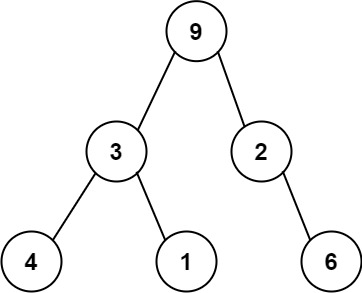One way to serialize a binary tree is to use preorder traversal. When we encounter a non-null node, we record the node's value. If it is a null node, we record using a sentinel value such as '#'.
For example, the above binary tree can be serialized to the string "9,3,4,#,#,1,#,#,2,#,6,#,#", where '#' represents a null node.
Given a string of comma-separated values preorder, return true if it is a correct preorder traversal serialization of a binary tree.
It is guaranteed that each comma-separated value in the string must be either an integer or a character '#' representing null pointer.
You may assume that the input format is always valid.
- For example, it could never contain two consecutive commas, such as
"1,,3".
Note: You are not allowed to reconstruct the tree.
Example 1:
Input: preorder = "9,3,4,#,#,1,#,#,2,#,6,#,#" Output: true
Example 2:
Input: preorder = "1,#" Output: false
Example 3:
Input: preorder = "9,#,#,1" Output: false
Constraints:
1 <= preorder.length <= 104preorderconsist of integers in the range[0, 100]and'#'separated by commas','.
Related Topics:
String, Stack, Tree, Binary Tree
// OJ: https://leetcode.com/problems/verify-preorder-serialization-of-a-binary-tree
// Author: github.com/lzl124631x
// Time: O(N)
// Space: O(N)
class Solution {
public:
bool isValidSerialization(string preorder) {
stack<int> s;
stringstream ss(preorder);
string node;
bool ended = false;
while (getline(ss, node, ',')) {
if (ended) return false;
if (node == "#") {
while (s.size() && ++s.top() == 2) s.pop();
if (s.empty()) ended = true;
} else {
s.push(0);
}
}
return s.empty();
}
};